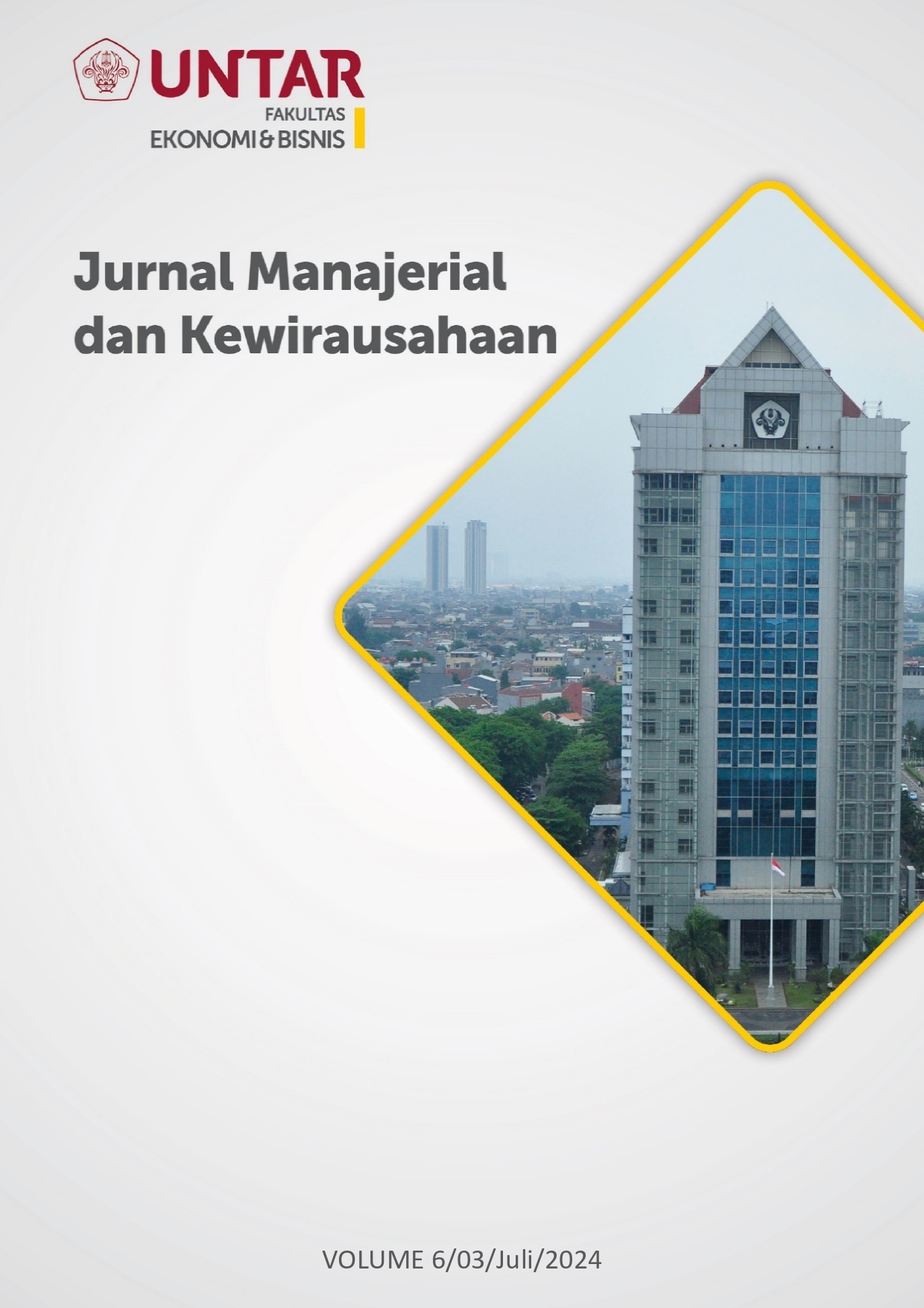Inovasi Produk sebagai Mediator Knowledge Management terhadap Competitive Advantage Coffee Shop
Main Article Content
Abstract
This study aims to analyze the effect of knowledge management on competitive advantage with the mediating role of product innovation in coffee shops in South Tangerang. A survey was conducted on the owners or managers of coffee shops in the area and a sample of 70 respondents was taken through the distribution of questionnaires to coffee shops with G-form. This study uses quantitative research methods and uses SEM-PLS to analyze the data obtained to test 4 research hypotheses. The results of the study show that knowledge management has a positive and significant effect on competitive advantage and product innovation, and there is a partial mediating role of product innovation in the relationship between knowledge management and competitive advantage. The path coefficient value shows that product innovation has a strong and significant direct effect on competitive advantage. The results of the model testing also show that the model has good predictive relevance and goodness of fit values. The managerial implications of the results of this study are that coffee shops should focus on the development of knowledge management and product innovation to have a competitive advantage in coffee shops in South Tangerang.
Article Details
Section

This work is licensed under a Creative Commons Attribution-NonCommercial-ShareAlike 4.0 International License.
This work is licensed under a Jurnal Muara Ilmu Ekonomi dan Bisnis Creative Commons Attribution-ShareAlike 4.0 International License.,/p>
References
Adi, B. E. (2005). Menjadikan Manajemen Pengetahuan sebagai Keunggulan Kompetitif Perusahaan Melalui Strategi Berbasis Pengetahuan. Jurnal Studi Manajemen dan Organisasi, 2(1), 58-68.
Choo, C. W. (1996). The Knowing Organization: How Organizations Use Information to Construct Meaning, Create Knowledge, and Make Decisions. International Journal of Information Management, 16(5), 329–340. https://doi.org/10.1016/0268-4012(96)00020-5
Dedy, N. M. & Soelaiman, L. (2023). Pengaruh Orientasi Pasar dan Bauran Pemasaran terhadap Keunggulan Bersaing Usaha Olahan Pala di Kota Ternate. Jurnal Ekonomi Pertanian dan Agribisnis, 7(4), 1496-1506. https://doi.org/10.21776/ub.jepa.2023.007.04.26
Ephelia, G. R. & Puspitowati, I. (2022). Pengaruh Fokus Pelanggan, Respon Pelanggan, Proaktif, Inovasi dan Pengambilan Resiko terhadap Kinerja UKM. Jurnal Manajerial dan Kewirausahaan, 4(3), 712-720. https://doi.org/10.24912/jmk.v4i3.19765
Fornell, C., & Larcker, D. F. (1981). Evaluating structural equation models with unobservable variables and measurement error. Journal of Marketing Research, 18(1), 39-50.
Ghozali, Imam. 2016. Aplikasi Analisis Multivariete Dengan Program IBM SPSS 23 (Edisi 8). Cetakan ke VIII. Semarang : Badan Penerbit Universitas Diponegoro.
Hair, J. F., Howard, M. C., & Nitzl, C. (2020). Assessing measurement model quality in PLS-SEM using confirmatory composite analysis. Journal of Business Research, 109, 101–110. https://doi.org/10.1016/j.jbusres.2019.11.069
Kavana, H. & Puspitowati, I. (2022). The Effect of Proactive Action, Innovation and Risk Taking on Business Performance. Dalam Proceedings of the Tenth International Conference on Entrepreneurship and Business Management, 284-289. https://doi.org/10.2991/aebmr.k.220501.043
Khasmir. (2022). Pengantar Metodologi Penelitian (Untuk Ilmu Manajemen, Akuntansi dan Bisnis) (Edisi 1). Cetakan ke I. Depok : Rajawali Pers.
Malhotra. (2015). Riset Penelitian. Jakarta: Gramedia Pustaka Utama.
Moldner, V., Soegoto, E., & Widjaja, A. (2020). The effect of knowledge management on product innovation: A study of the Indonesian manufacturing industry. Journal of Business Research, 120, 272-280
Nonaka, Ikujiro & Takeuchi, Hirotaka (1995). The Knowledge – Creating Company. New York : Oxford University Press, Inc.
Saptaji, M. F. D., Hubeis, M., & Zulbainarni, N. (2023). Strategi Pengembangan Usaha Pada Coffee Shop Int.Space Pasca Covid-19 di Kota Rangkasbitung. Jurnal Aplikasi Bisnis dan Manajemen. https://doi.org/10.17358/jabm.9.3.943
Sekaran, U., & Bougie, R. (2016). Research methods for business: A skill-building approach (7th ed.). New York: Wiley.
Silaen, S. (2018). Metodologi Penelitian Sosial untuk Penulisan Skripsi dan Tesis. Bogor: In Media.
Sugiyono. (2018). Metode penelitian kuantitatif, kualitatif, dan R&D (edisi revisi). Bandung: Alfabeta.
Tran, K. D. P., Vo T.N., T., & Thai N.B., T. (2023). The effect of innovation on competitive advantage and SMEs performance in Vietnam: The moderating role of customer orientation. International Journal of Innovation Science. https://doi.org/10.1108/IJIS-08-2022-0161
Wahyono, W. (2019). The mediating effects of product innovation in relation between Knowledge Management and competitive advantage. Journal of Management Development, 39(1), 18–30. https://doi.org/10.1108/jmd-11-2018-0331
Wetzels, M., Odekerken-Schröder, G., Van Oppen, C., (2009). Using PLS path modeling for assessing hierarchical construct models: guidelines and empirical illustration. MIS Quarterly 33: 177–195.
Widyanto, F. C. (2022). Pengaruh knowledge management dan inovasi produk terhadap keunggulan kompetitif usaha bisnis kedai kopi di Tangerang. Jurnal Ilmiah Manajemen dan Bisnis, 10(1), 1-12.

